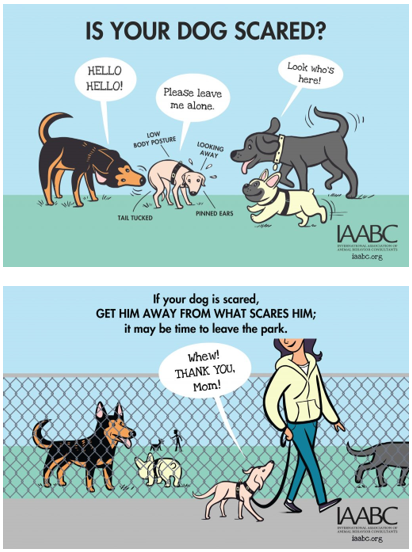Dog Parks & Doggy Daycare
Before you head out to the dog park…
By Angelia Oliverei, LVT & Cathryn Adolph, LVT, CCRP, CCFT
No one can deny that daycare and dog parks have become very popular with dog owners across the country. They are great ways to provide enrichment and exercise for dogs. Before making a trip to the dog park or daycare, you may want to consider your dog’s current health, physical condition, and behavior around other dogs.
Health
Your dog should be healthy and up to date on their vaccines. Doggy daycare requires up to date vaccines and negative fecal tests for all the dogs in their care. However, most dog parks have little to no screening processes for dogs using their park. This can expose your dogs to communicable diseases and parasites. Parasites can range from intestinal parasites, such as roundworms, to external parasites such as fleas and ticks.
Should your dog show signs of an infectious disease or parasite, you should get veterinarian approval before returning to the dog park. Even though your dog is receiving treatment, they can shed pathogens and potentially infect other dogs at the park. Most diseases considered part of the Canine Infectious Respiratory Disease Complex (CIRDC) are shed for less than two weeks. However, a strain of Bordetella (Bordetella bronchiseptica) can be shed for up to 2-3 months!
Physical Condition
Many dog parks and doggy day care centers have separate play areas for smaller dogs. In the excitement of play, big dogs can inadvertently hurt smaller dogs. If your small dog is scared of larger dogs, only choose play options that include a special area for smaller pups!
Use caution when taking puppies to a dog park or doggy daycare. They are small, still developing their immune system, and can be easily overwhelmed by a large group of dogs. They are often still learning the nuances of dog body language and can miss or misinterpret signals that can get them into trouble. Puppies also have open growth plates which are especially fragile. Rough play could potentially cause damage to these growth plates. Smaller play groups such as puppy classes, ensure the puppies are similar in size and are up to date on their vaccines.
For our older, possibly arthritic dogs extended amounts of play can be detrimental. The excitement and adrenaline rush kick in and they pull us across the parking lot to the park or day care. This can result in dogs not feeling discomfort from joint pain. In these cases a dog can easily overdo it, which can ultimately lead to arthritic dogs becoming lame later that day or even into the following days! Shorter play times may be more appropriate, but if your dog is still coming up lame, a less intense form of enrichment may be more appropriate and this may warrant a recheck visit at you veterinarian’s office.
 Behavior
Behavior
Some dogs simply don’t like to hang out with strange dogs, larger groups of dogs, and/or other dogs in general . Going into a daycare or dog park environment can be stressful for them. Dog parks are an attractive option to allow your dog to run while being in an enclosed area. However, if your dog doesn’t care of other dogs, try visiting the park during slow times or walk laps around the park with your dog instead of hanging out in the popular spots. On the opposite hand, we can have dogs that are too friendly. This can range from over-excited greetings to full-on bullying. If your dog is coming on too strong with others, they should be leashed and removed the situation before it escalates.
Familiarizing yourself with dog body language before heading to the dog park can be very beneficial. Dogs communicate primarily through body language and can be quite expressive if you know what to look for.
Moderation
Dog parks and day care can be a fantastic outlet for our pets., but as our dog’s advocates, it is our responsibility to ensure their safety. While accidents may happen, understanding your dog can help prevent them.
For more information, Dr. Ellen Lindell VMD DACVB wrote an excellent article about dog parks. While the focus is on dog parks, similar concepts can be applied to day cares as well. To read the article, click here.
The International Association of Animal Behavior Consultants produced the posters used in this blog. To learn more visit iaabc.org.
